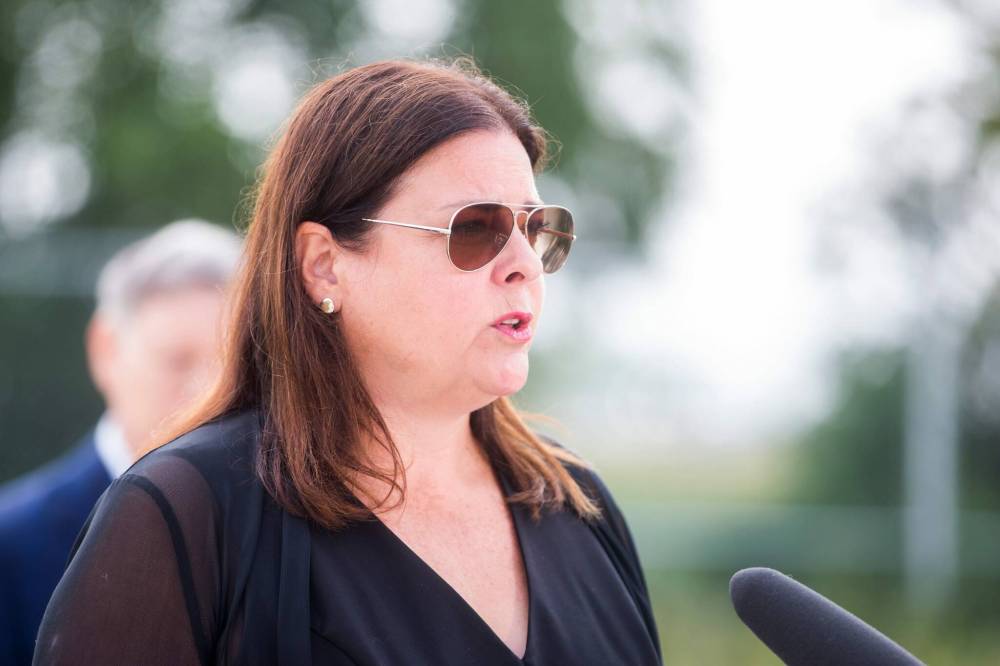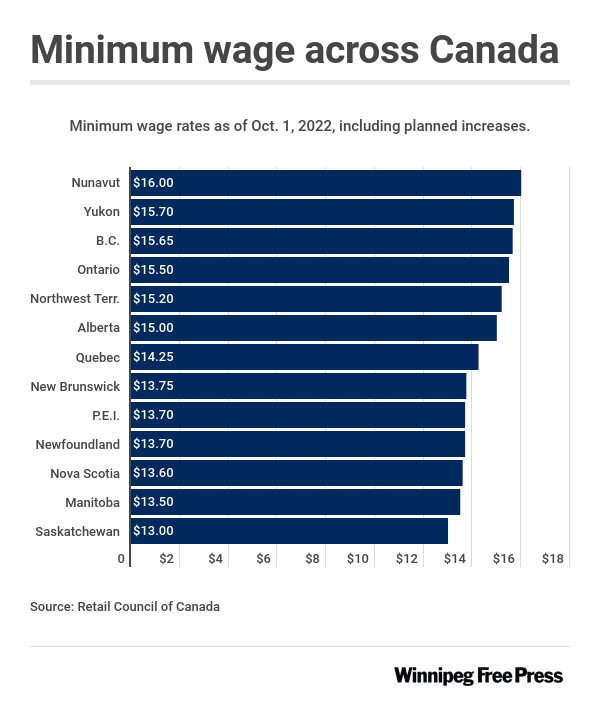Manitoba to raise minimum wage to $15 in time for 2023 election
Advertisement
Read this article for free:
or
Already have an account? Log in here »
To continue reading, please subscribe:
Monthly Digital Subscription
$0 for the first 4 weeks*
- Enjoy unlimited reading on winnipegfreepress.com
- Read the E-Edition, our digital replica newspaper
- Access News Break, our award-winning app
- Play interactive puzzles
*No charge for 4 weeks then price increases to the regular rate of $19.00 plus GST every four weeks. Offer available to new and qualified returning subscribers only. Cancel any time.
Monthly Digital Subscription
$4.75/week*
- Enjoy unlimited reading on winnipegfreepress.com
- Read the E-Edition, our digital replica newspaper
- Access News Break, our award-winning app
- Play interactive puzzles
*Billed as $19 plus GST every four weeks. Cancel any time.
To continue reading, please subscribe:
Add Free Press access to your Brandon Sun subscription for only an additional
$1 for the first 4 weeks*
*Your next subscription payment will increase by $1.00 and you will be charged $16.99 plus GST for four weeks. After four weeks, your payment will increase to $23.99 plus GST every four weeks.
Read unlimited articles for free today:
or
Already have an account? Log in here »
Hey there, time traveller!
This article was published 18/08/2022 (1209 days ago), so information in it may no longer be current.
Minimum-wage workers will see their hourly pay increase nearly 13 per cent this fall as the province aims to hit $15 by October 2023 in a move labour groups argue will drive more low-income earners into poverty.
Premier Heather Stefanson said her government will raise minimum wage incrementally in light of soaring inflation and to stay competitive with other jurisdictions. As of Oct. 1, minimum wage will increase from $11.95 to $13.50. Another 65-cent increase is planned for April 1, 2023, bringing wages to $14.15 per hour.
“Our balanced approach to increasing the minimum wage will help workers make ends meet while also recognizing the concerns of small businesses who are struggling during this difficult time,” Stefanson told reporters during an announcement at the Manitoba Legislative Building with Labour Minister Reg Helwer and Economic Development Minister Cliff Cullen.

MIKAELA MACKENZIE / WINNIPEG FREE PRESS FILES
“This phased-in approach will ensure small businesses remain strong and continue to grow while helping workers and their families get ahead,” Premier Heather Stefanson wrote in a news release.
The Progressive Conservative government passed legislation in June allowing minimum wage to be increased by an additional amount when the inflation rate in Manitoba exceeds five per cent in the first three months of the year. Since 2017, annual minimum-wage increases have been indexed to inflation.
Stefanson said the province will revert back to using the consumer price index to determine the minimum wage increase for October 2023.
A forecast rise of about six per cent to the consumer price index would put Manitoba’s minimum wage at about $15, Helwer said. However, the labour minister did not guarantee the $15 rate, saying inflation could drive that figure either higher or lower.
“We intend to get to the $15 range. We don’t know what inflation is going to be for the next year,” he said.
The province’s labour management review committee was tasked with recommending a new minimum wage but was unable to come to an agreement. Labour groups had been calling for a $16.15 hourly rate to ensure people who are working full time are above the poverty line.
“Minimum-wage workers deserve not to live in poverty. If you work full time, that should be a pass out of poverty, not a poverty trap, but it continues to be one in Manitoba,” said Manitoba Federation of Labour president Kevin Rebeck. “Our government is not requiring business to do what’s right or what’s fair and allowing poverty-level wages to continue.”
Following the $1.55 increase on Oct. 1, Manitoba will have the second-lowest minimum wage among the provinces, creeping past Saskatchewan by 50 cents.
Rebeck said the planned increases do not do enough to maintain a competitive labour advantage in Manitoba and argued large, multinational businesses and retailers can afford to pay their employees a living wage. The federation leader dismissed concerns a significant wage increase could drive up prices at major retailers.
“For some small businesses that have had it tough during COVID, absolutely government should provide some added extra supports but it should be targeted. The Walmarts of the world don’t need that same tax break or support,” Rebeck said.
Winnipeg Chamber of Commerce chief executive officer Loren Remillard said businesses recognize that the government needs to respond to inflation. However, the province must also recognize the hardship an increased minimum wage is going to cause small businesses.
“At the end of the day, these are small businesses, many are family-run businesses that are coming out of a pandemic, they were the first hit, one of the last out of the pandemic,” Remillard said. “They know that we’re seeing people making choices as to where they’re spending their money because of inflation, so the sector itself is still reeling.”
Remillard said the province needs to work with small businesses to offset any impacts.

“It’s easy for government to make businesses make changes when it’s their money,” he said. “So if the government’s going to do that, we hope that they step forward with measures that utilize their own funds.”
Cullen said the province will consult businesses and industry on potential support programs to avoid “unintended consequences” of the wage increase. The minister said he is hopeful a program would be announced before Oct. 1.
“We’re committed to some kind of relief for small business over this course of time. We haven’t set any programs. We want to hear from them over the next few weeks,” Cullen said.
Meanwhile, Opposition leader Wab Kinew said the new minimum wage fails to meet the needs of Manitobans. Kinew said the province should have introduced a $15 minimum wage immediately.
“At the end of the day, your family, the working person in Manitoba needs help right now through this summer of inflation,” Kinew said.
Liberal Leader Dougald Lamont called the Tories’ plan a “half-step in the right direction.”
“I don’t know that it will be enough to actually help people, partly because it’s too slow,” he said. “The real question is how much it’s going to help people in the face of inflation, and I don’t think it’s going to be enough.”
— With files from Malak Abas
danielle.dasilva@freepress.mb.ca

Our newsroom depends on a growing audience of readers to power our journalism. If you are not a paid reader, please consider becoming a subscriber.
Our newsroom depends on its audience of readers to power our journalism. Thank you for your support.
History
Updated on Thursday, August 18, 2022 7:53 PM CDT: Nova Scotia’s minimum wage will be $13.60 on October 1.


